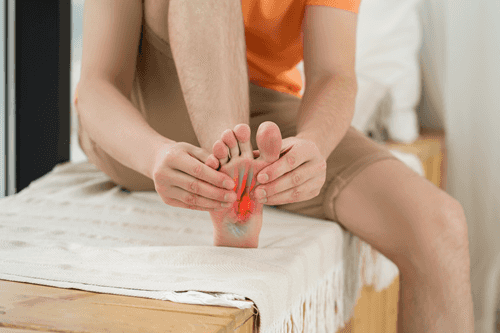
Expert Physiotherapy at Home
Certified physiotherapists visit you at home to provide focused, one-on-one care tailored to your needs. With no travel or waiting rooms, recovery happens in a setting that is comfortable, familiar, and built around your convenience.
Personalised Recovery Programmes
Every treatment plan is designed to suit your condition, goals, and pace. Our physiotherapists follow structured, evolving protocols to ensure consistent progress, with each session aligned to deliver meaningful results.
Trusted Physiotherapists. Real Results.
Our team comprises experienced, background-verified physiotherapists trusted by thousands of families. With a strong focus on safety, reliability, and clinical outcomes, we make recovery at home both effective and reassuring
Patient Testimonials
Portea Physiotherapists for Home Visits
Meet some of our experienced and dedicated healthcare professionals

Dr. Lokesh G
Physiotherapist
Specializations
Experienced in Neurological rehabilitation, Orthopaedic physiotherapy, and Paediatric care
Delivers structured, high-impact treatment plans across neuro, ortho, and paediatrics—ensuring safety, comfort, and measurable recovery at every stage.

Dr. Mohammed Sarwar
Physiotherapist
Specializations
Experienced in Neurological rehabilitation, Adult physiotherapy, and Paediatric care
Combines deep clinical expertise with a compassionate approach, supporting both adults and children through neuro and physical rehabilitation that promotes long-term independence and recovery.

Dr. Nelapati Divya
Physiotherapist
Specializations
Skilled in Orthopaedic rehabilitation, Manual therapy techniques, and Paediatric physiotherapy
Brings a personalised, hands-on approach to healing—combining structural expertise with paediatric sensitivity to restore movement, relieve pain, and improve everyday function.

Dr. Naveen V
Physiotherapist
Specializations
Trained in Pain management, Cardiac and Orthopaedic rehabilitation, Neurological care, and Neural tissue mobilisation
Brings clinical precision and empathy together—designing science-backed recovery protocols for pain relief, nerve mobilisation, and cardio-neuro-ortho rehabilitation across all age groups

Dr. Miloni Savla
Physiotherapist
Specializations
Holds an MPT in Orthopaedics with a focus on Musculoskeletal rehabilitation and strength recovery
Delivers focused, movement-oriented therapy grounded in orthopaedic science—helping patients rebuild strength, restore function, and return to daily life with confidence
Other Cities
Physiotherapy Treatments

what causes plantar fasciitis and how can i relieve heel pain?
The primary symptom of plantar fasciitis is heel pain, which is most noticeable when taking the first steps after waking up or after extended rest periods. The pain is typically sharp and concentrated at the bottom of the heel but may radiate along the arch of the foot. As the condition progresses, discomfort may become persistent throughout the day, especially after prolonged standing, walking, or physical activity. Some individuals experience increased stiffness in the foot, making movement difficult in the morning or after sitting for an extended duration. In severe cases, swelling and tenderness around the heel area may also occur, further exacerbating discomfort.
what are the common causes of plantar fasciitis and foot strain?
Plantar fasciitis is primarily caused by excessive stress and strain on the plantar fascia, leading to microtears and inflammation. Repetitive impact activities such as running, jumping, or standing for long periods can contribute to its development. Poor foot biomechanics, including flat feet, high arches, or an abnormal walking pattern, can also place undue stress on the fascia. Wearing improper footwear, such as unsupportive shoes or high heels, increases strain on the foot and exacerbates symptoms. Additionally, excess body weight adds pressure to the plantar fascia, making obesity a significant risk factor. Aging also plays a role, as the plantar fascia loses elasticity over time, making it more prone to injury.
what are the risk factors for plantar fasciitis and heel inflammation?
Several factors increase the risk of developing plantar fasciitis. Individuals who engage in high-impact sports, such as long-distance running, basketball, or dance, are at a higher risk due to repetitive strain on the feet. Occupations that require prolonged standing, such as teaching, factory work, or retail jobs, also predispose individuals to this condition. Foot structure abnormalities, including overpronation, flat feet, or excessively high arches, can alter weight distribution and increase tension on the plantar fascia. Poor footwear choices, particularly those lacking arch support or adequate cushioning, contribute to the problem. Additionally, tight calf muscles and Achilles tendons reduce flexibility in the foot, increasing strain on the fascia. Age is another significant factor, with middle-aged and older individuals being more susceptible due to natural degeneration of the connective tissue.
how can you prevent plantar fasciitis and avoid heel pain?
Preventing plantar fasciitis involves adopting proper foot care practices and lifestyle modifications. Wearing supportive shoes with adequate arch support and cushioning reduces strain on the plantar fascia and minimizes the risk of injury. Regularly stretching the calf muscles and the plantar fascia itself enhances flexibility and reduces tension on the foot. Maintaining a healthy weight prevents excessive stress on the feet, lowering the likelihood of developing inflammation. Gradually increasing physical activity levels rather than engaging in sudden, intense workouts helps prevent overuse injuries. Using orthotic insoles or arch supports can provide additional cushioning and alignment for individuals with foot structure abnormalities. Additionally, avoiding prolonged standing or walking on hard surfaces and taking breaks during physical activities can further reduce stress on the plantar fascia.
how is plantar fasciitis diagnosed and what are the treatment options?
Diagnosing plantar fasciitis begins with a thorough medical history review and physical examination, during which a healthcare provider assesses foot pain, tenderness, and flexibility. Imaging tests such as X-rays or MRIs may be conducted to rule out other potential causes of heel pain, such as stress fractures or arthritis. Treatment varies depending on the severity of symptoms, with conservative approaches often being effective. Resting the foot and reducing activities that exacerbate pain are essential initial steps. Ice therapy can help reduce inflammation and numb pain when applied to the affected area multiple times a day. Nonsteroidal anti-inflammatory drugs (NSAIDs) like ibuprofen or naproxen may be recommended to manage pain and swelling. Stretching exercises for the calf and plantar fascia improve flexibility and alleviate discomfort. In more persistent cases, custom orthotics, night splints, or corticosteroid injections may be prescribed to relieve symptoms. For individuals with chronic or severe pain, extracorporeal shock wave therapy (ESWT) or surgical intervention may be considered.
what are the benefits of physiotherapy for plantar fasciitis recovery?
Physiotherapy plays a crucial role in managing plantar fasciitis by addressing pain, improving flexibility, and preventing recurrence. A structured physiotherapy program includes specific stretching and strengthening exercises to alleviate tension in the plantar fascia and surrounding muscles. Manual therapy techniques such as soft tissue mobilization and myofascial release help reduce pain and improve circulation to the affected area. Taping techniques and foot orthoses can provide temporary relief by supporting the arch and reducing strain on the fascia. Additionally, physiotherapists educate patients on proper footwear choices, gait modifications, and activity modifications to prevent further aggravation of symptoms. Gradual reintroduction to physical activity under guided supervision ensures a safe return to normal function.
how effective is home-based physiotherapy by portea for treating plantar fasciitis?
At Portea, we understand the challenges of living with plantar fasciitis. Our home-based physiotherapy services are tailored to the specific needs of each individual, providing personalized care to help them regain mobility and independence in a safe and supportive environment. We also specialize in providing expert physiotherapy services for post-surgical rehab, arthritis, neuro-rehab, sports injury, orthopedic physiotherapy, physiotherapy for elderly, for respiratory disorders, and more – all delivered conveniently at your home. Our dedicated team ensures you receive the personalized care you need for a smooth and successful recovery.
faqs
1. How long does it take to recover from plantar fasciitis?
Recovery varies by individual but typically takes 6 to 12 weeks with proper care, including rest, stretching, supportive footwear, and physiotherapy.
2. Can plantar fasciitis heal without medical treatment?
Mild cases may improve with self-care like rest and stretching. However, physiotherapy and professional guidance help prevent chronic pain and faster recovery.
3. Is walking good or bad for plantar fasciitis?
Moderate walking in supportive shoes may help, but excessive walking or walking barefoot can worsen symptoms. Rest and guided movement are ideal.
4. Can plantar fasciitis come back after treatment?
Yes, especially if triggers like poor footwear, weight gain, or overuse persist. Ongoing physiotherapy and foot care help prevent recurrence.
5. Are there specific exercises to relieve plantar fasciitis pain?
Yes, calf stretches, plantar fascia stretches, and foot-strengthening exercises are beneficial. These should be done under the guidance of a physiotherapist.
Doctor Consultation
Nursing
Physiotherapy
Trained Attendant
Elder Care
Mother & Baby Care
Lab Tests
Medical Equipment
Speciality Pharma
Critical Care




